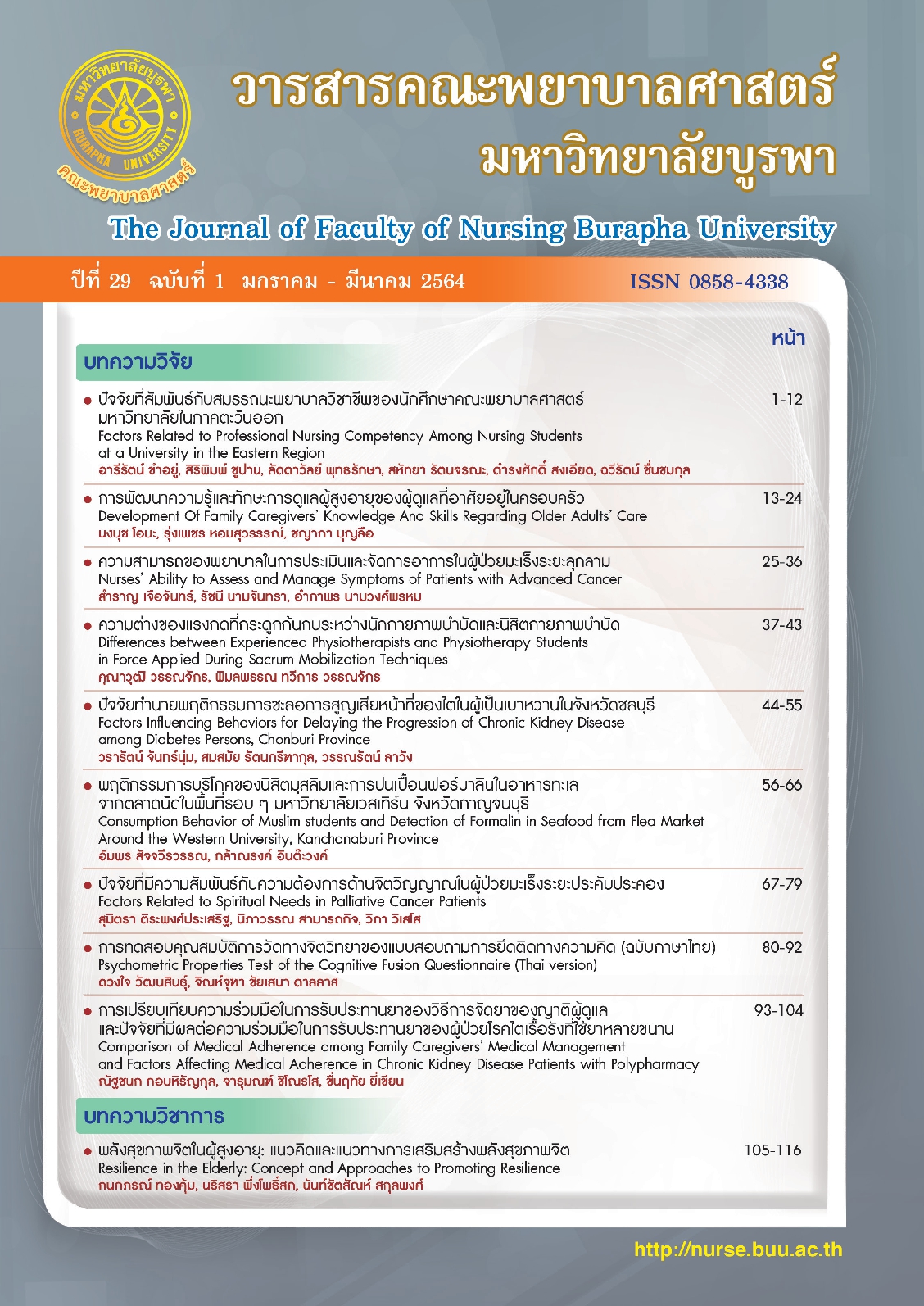ปัจจัยที่เกี่ยวข้องกับสมรรถนะพยาบาลวิชาชีพของนิสิตคณะพยาบาลศาสตร์ มหาวิทยาลัยในภาคตะวันออก
คำสำคัญ:
สมรรถนะพยาบาลวิชาชีพ, ทัศนคติต่อวิชาชีพ, ความฉลาดทางอารมณ์, ผลสัมฤทธิ์ทางการเรียน, นักศึกษาพยาบาลบทคัดย่อ
การวิจัยแบบบรรยายหาความสัมพันธ์นี้มีวัตถุประสงค์เพื่อศึกษาสมรรถนะพยาบาลวิชาชีพและปัจจัยที่มีความสัมพันธ์กับสมรรถนะพยาบาลวิชาชีพ กลุ่มตัวอย่างเป็นนักศึกษาชั้นปี 4 หลักสูตรพยาบาลศาสตรบัณฑิต มหาวิทยาลัยแห่งหนึ่งในภาคตะวันออก จำนวน 156 คน เครื่องมือวิจัยเป็นแบบประเมินสมรรถนะพยาบาลวิชาชีพ แบบประเมินทัศนคติต่อวิชาชีพ และแบบประเมินความฉลาดทางอารมณ์ วิเคราะห์ข้อมูลด้วยสถิติพรรณนาและสัมประสิทธิ์สหสัมพันธ์แบบเพียรสัน
ผลการวิจัยพบว่า สมรรถนะพยาบาลวิชาชีพโดยรวมของนักศึกษาพยาบาลอยู่ในระดับสูง (M = 3.72, S.D. = 0.36) สมรรถนะพยาบาลวิชาชีพระดับสูง ได้แก่ ด้านคุณลักษณะทางวิชาชีพ (X̅ = 4.24, S.D. = 0.60) ด้านจริยธรรม จรรยาบรรณและกฎหมาย (X̅ = 4.20, S.D. = 0.55) และด้านสังคม (X̅ = 3.98, S.D. = 0.71) สมรรถนะพยาบาลวิชาชีพระดับปานกลาง ได้แก่ ด้านภาวะผู้นำ การจัดการและการพัฒนาคุณภาพ (X̅ = 3.65, S.D. = 0.51) ด้านเทคโนโลยีสารสนเทศ (X̅ = 3.64, S.D. = 0.52) ด้านการสื่อสารและสัมพันธภาพ (X̅ = 3.63, S.D. = 0.47) ด้านการปฏิบัติการพยาบาลและการผดุงครรภ์ (X̅ = 3.62, S.D. = 0.45) และด้านวิชาการและการวิจัย (X̅ = 3.39, S.D. = 0.47) ทัศนคติต่อวิชาชีพอยู่ในระดับดีมาก (X̅ = 4.26, S.D. = 0.46) ความฉลาดทางอารมณ์อยู่ในระดับปกติ (X̅ = 166.59, S.D. = 13.37) ทัศนคติต่อวิชาชีพ และความฉลาดทางอารมณ์มีความสัมพันธ์ทางบวกในระดับปานกลาง (r = .415, p <.01 และ r = .323, p <.01 ) กับสมรรถนะพยาบาลวิชาชีพอย่างมีนัยสำคัญทางสถิติ ส่วนผลสัมฤทธิ์ทางการเรียนไม่มีความสัมพันธ์กับสมรรถนะพยาบาลวิชาชีพ ผลการศึกษานี้เสนอแนะว่า ผู้บริหารทางการศึกษาพยาบาลและผู้บริหารทางการพยาบาลควรใช้ข้อค้นพบนี้ในการพัฒนาสมรรถนะพยาบาลวิชาชีพ ทัศนคติต่อวิชาชีพ และความฉลาดทางอารมณ์ ของนิสิตและพยาบาลจบใหม่
เอกสารอ้างอิง
Beauvais, A. M., Brady, N., O’Shea, E. R., & QuinnGriffin, M. T. (2011). Emotional intelligence and nursing performance among nursing students. Nurse Education Today, 31, 396-401.
Bloom, B.S. (1976). Human Characteristics and School Learning. New York: McGraw-Hill. p.219– 224.
Cohen, J. (1988). Statistical power analysis for the behavioral science. (2nd ed.). New Jersey: Lawrence Erlbaum Associates.
Do, E. S., & Seo, Y. S. (2014). Factors influencing clinical competence in nursing students. J Korean Acad Fundam Nurs, 21(3), 283 – 291.
Gagne, R. (1985). The Conditions of Learning. (4th ed.). New York: Holt, Rinehart & Winston.
Good (1973). Dictionary of Education. 3rd ed. New York: Mc Grow Hill.
Goleman, D. (1998). Working with emotional intelligence. New York: Bantum Books.
Kajander-Unkuri, S. (2015). Nurse competence of graduating nursing students. Nurse Education Today, 35, 351 – 365.
Kooariyakul, A., Yodtawee, W., Intichoat, N., Naunthong, W., & Inpanao, W. (2012). Nursing attitude of nursing students in Boromrajchonnee Utaradit, Nursing College. Journal of Health Science Research, 6(1), 18 – 26. [In Thai]
Kunaviktikul, W., Sukontasan, A., Wangsrikoon, S., & Srepunapan, A. (2007). Review of nursing production system congruent with healthcare system and people’s healthcare needs. Chiengmai: Faculty of Nursing, Chiengmai University. [In Thai]
Mental Health Department. (2002). Development of emotional intelligence screening test for Thai people age 12 – 60. Bangkok: Bureau of Mental Health, Mental Health Department. [In Thai]
Morolong, B. G. & Chabeli, M. M. (2005). Competence of newly qualified registered nurses from a nursing college. Journal of the Democratic Nursing Organization of South Africa, 28(2), 38 – 50.
Moyo, S. E. & Sianga, R. M. (2017). Attitude influence and competency of the nursing process among higher diploma general nursing students of Kanye Seventh Day Adventist College of Nursing. JOGRESS, 9(2), 76 - 92.
Nuchsutham, W. (2016). Emotional quotient of nursing students, Faculty of Nursing, Chiang Rai College. Journal of Community Health Development, Khonkan University, 4(4), 505 – 519. [In Thai]
Por, J., Barriball, L., Fitzpatrick, J., & Roberts, J. (2011). Emotional intelligence: its relationship to stress, coping, well-being and professional performance in nursing students. Nurse Education Today, 31, 855 – 860.
Sanguansiritham, U. (2007). Nursing Profession Development. Chiengmai: Chang Puang Printing. [In Thai]
Srisatitnarakul, B. (2010). Nursing Research Methodology (5th ed.). Bandkok: You and I Intermedia, Ltd. [In Thai]
Sulosaari, V., Huupponen, R., Hupli, M., Puukka, P., Torniainen, K., & Leino-Kilpi, H. (2015). Factors associated with nursing students’ medication competence at the beginning and end of their education. BMC Medical Education, 15, 223 Retrived from Science Direct.
Talarico, J. F., Varon, A.J., Banks, S.E., Berger, J.S., Pivalizza, E.G., Medina-Rivera, G. Rimal, J.,… Metro, D.G. (2013). Emotional intelligence and the relationship to resident performance: a multi-institutional study. Journal of Clinical Anesthesia, 25, 181 -187.
Thailand Nursing and Midwifery Council. (2013). Competencies of registered nurses (2nd ed.). Bangkok: Siriyoad Publishing. [In Thai]
Viphonephom, K. (2003). Attitude toward the nursing profession of nursing midwife students in college of health technology Vientiane, Lao people, s democratic republic. A thesis in master of science (public health nursing), Graduate studies, Mahidol University.
Walsh, C. M., & Seldomridge, L. A. (2005). Clinical grades: Upward bound. Journal of Nursing Education, 44(4), 162 – 168.
Winijkul, S. & Reansuwong, S. (2014). Relationship between attitude toward nursing profession, academic achievement and nursing practice competencies among graduate nurses from Kuakarun Faculty of Nursing. Kuakarun Journal of Nursing, 21(2), 113 – 125. [In Thai]





